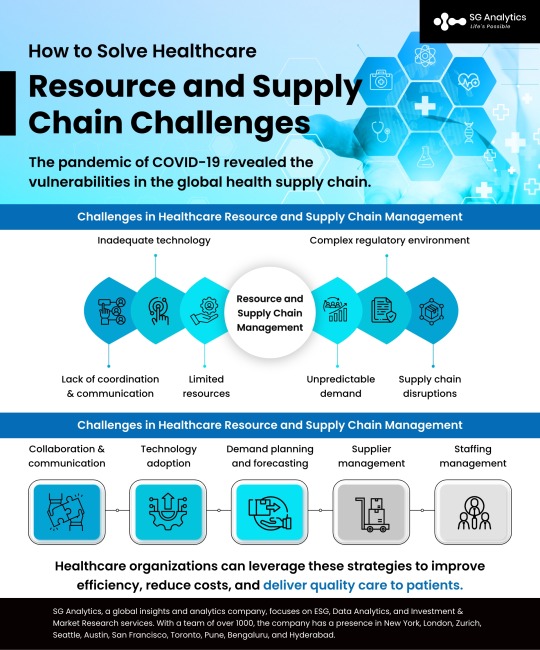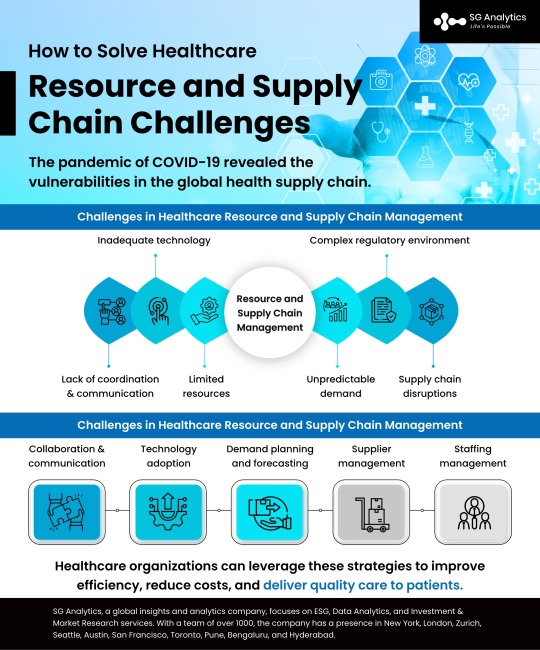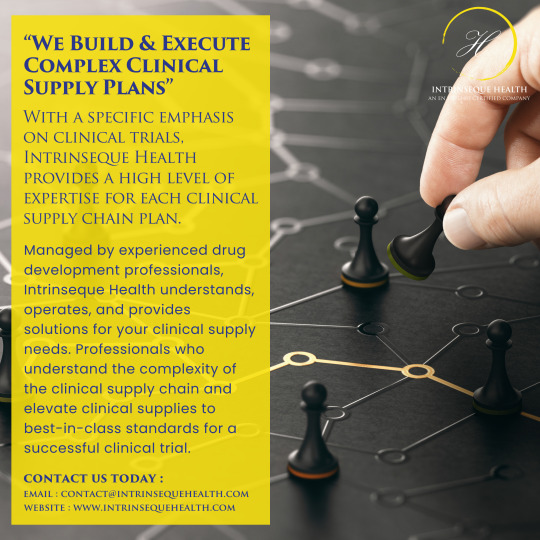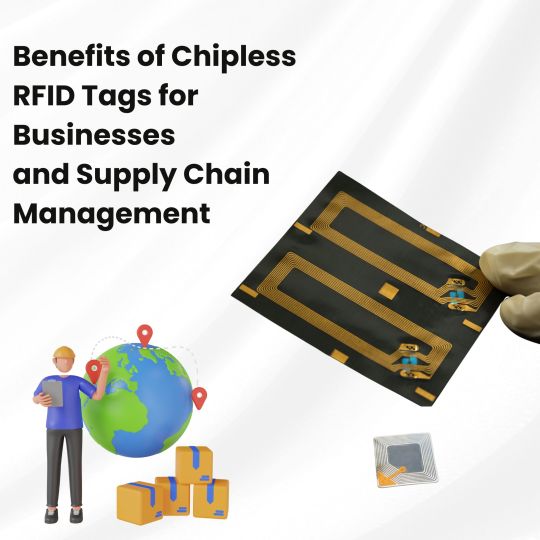#Healthcare supply chain
Explore tagged Tumblr posts
Text

Discover how effective hospital inventory management can enhance patient care, reduce costs, and streamline operations. Learn best practices and solutions to optimize your healthcare inventory today.
0 notes
Text
How to solve healthcare resource and supply chain challenges

Healthcare organizations can leverage different strategies and techniques to improve efficiency, reduce costs, and deliver quality care to patients.
Read More: https://uk.sganalytics.com/blog/healthcare-resource-and-supply-chain-challenges/
#Healthcare resource#Health resource solutions#Supply chain challenges#Supply chain challenges 2023#Healthcare supply chain
1 note
·
View note
Text

The healthcare supply chain is becoming increasingly complex due to expanding regulatory requirements, rising prices, and rising customer expectations. Profit margins can be drastically improved by adopting lean supply chain practices and implementing related technological and operational solutions. Pharmaceutical and medical device firms can save or improve the lives of people all around the world if they adopt a supply chain revolution.
SG Analytics, a top healthcare analytics service provider, uses proprietary ML tools to assist you with data cleansing, data management and developing insightful dashboards. These tools can help you with strategic market access, market entry, competitive intelligence, drug forecasting and many other tasks.
SG Analytics' network of 700+ key opinion leaders across many geographies enables us to provide our clients with more timely and effective solutions. For the past 10 years, SG Analytics' HRA (healthcare research and analytics) services have been assisting healthcare product and service businesses.
#healthcare#Healthcare resource#Health resource solutions#Supply chain challenges#Supply chain challenges 2023#Healthcare supply chain
0 notes
Text
Leading Healthcare Supply Chain Trends to Watch in the Next 5 Years

Introduction With the healthcare industry constantly evolving and changing, organizations are discovering new ways to eliminate waste, reduce costs, and prioritize patient concerns.
Although the COVID-19 pandemic has weakened healthcare supply chains and caused shortages of personal protective equipment (PPE) and other essential medical supplies, it has acted as a catalyst of innovation and digital transformation in healthcare supply chain management solutions .
Healthcare and medical organizations have learned the hard way to abandon traditional ways of thinking, such as mindsets that prioritize just-in-time supply chain provision and logistics improvements above all else.
Tight, fragile supply networks and poor inventory management have caused severe drug and treatment supply shortages in the past. However, with the emergence of innovation
ve technologies and trends, now is the time to embrace new thinking that emphasizes supply chain resilience, flexibility, and agility, making supply chains stronger and more flexible. This will enable healthcare facilities to handle unexpected increases in demand and survive unexpected disruptions brought about by pandemics, natural disasters, or cyber attacks in the future.
Top Upcoming Healthcare Supply Chain Trends to Know in 2022 In recent years, healthcare providers have been concentrating on supply chain management solutions to not only increase the efficiency of supply chain networks but also to gain greater visibility across the entire supply chain.
With the goal of streamlining the ordering process, enhancing demand planning & inventory management, and informing purchasing contract decisions, healthcare providers have begun to understand the potential of advanced healthcare delivery solutions . . . . Since then, these organizations have recognized the importance of an efficient and reliable supply chain as a key competitive differentiator.
Significant increases in medical and healthcare expenditures are observed worldwide due to the rapidly increasing number of different diseases and conditions, such as chronic diseases, infectious diseases, and genetic disorders. According to the survey, national health expenditures in the U.S. are 1.5 percent of the total. reached US$ 4.1 billion by 2020, including spending of US$ 829 billion on Medicare and US$ 671 billion on medical aid.
Therefore, healthcare organizations, medical device manufacturers, and other entities participating in the medical supply chain are investing in innovative supply chain and process solutions to provide optimal and timely treatment to patients.
Innovation is not only important for reducing operating costs and streamlining business processes, but it is also necessary for providing superior care to patients and enhancing clinical outcomes. Let’s take a look at some of the top healthcare delivery trends that are transforming the healthcare sector.
Rapid Access to Medical Facilities Shortages of medical supplies and components are not new challenges for the healthcare industry. Hospitals and other medical institutions have faced increasing disruptions in supply over the past decade, ranging from shortages of personal protective equipment and medical supplies to improper management of medical goods. This was most evident in the past two years, during the COVID-19 pandemic.
Healthcare producers previously adopted a strategy of charging higher premiums for medical expenses or collecting them on their balance sheets. However, the issue with this strategy was that during times of severe and unprecedented shortages, few supplies and components were left to acquire and maintain in inventory, forcing hospitals to adopt a more discretionary supply strategy . . . .
Medical institutions need a diverse pool of suppliers and cannot rely solely on timely inventory ordering. Consequently, a rapid increase in the propensity to adopt sophisticated supply chain solutions is observed across the industry to monitor movement rates of specific suppliers. These
0 notes
Text
is it just my eating disorder or should the agricultural society of america not have a say in how many calories the average person ought to eat per day?
#maybe i would also say you should have that many calories worth of grains if i was being paid six figures#to say as much#sus#scientific study#fake science#agriculture#eating disorder#for profit healthcare#weightloss#motivation#goals#suspicious#big food#supply chain#supply chain management#food crisis#thinspo#th1n$po#th1nsp1ration
29 notes
·
View notes
Text

Intrinseque Health - Clinical Supply Chain We Build and Execute Complex Clinical Supply Plans
Intrinseque Health is an EN ISO 13485 Certified Global clinical trial support services provider committed to the utmost in service delivery to drug development organizations (Pharmaceutical, Biotechnology, Medical Device & Contract Research Organizations (CROs)). Our team of industry professionals has over 300 years of combined experience supporting global clinical trials across a wide array of therapeutic areas. This vast experience enables us to empathize with our Customers while providing best-in-class solutions to overcome the hurdles and pain-points of conducting a clinical trial.
Regions & countries throughout the world will often present a unique set of regulatory and logistical challenges. It is our responsibility to understand and overcome these while ensuring that your products, supplies, equipment and services are available where needed to ensure study timelines are met. Intrinseque Health utilizes an operational methodology that is based on proven, cost-effective clinical supply chain strategy for each clinical trial. Our practice is to engage with our customers, early and often to ensure implementation of a robust clinical supply plan, resulting in the most successful study start-up and initiation.
#clinical supply#clinical trials#health#healthcare#supplychainmanagement#clinical supply chain#clinical supply chain management#drug development
2 notes
·
View notes
Text
Decentralized Finance (DeFi) Solutions
Decentralized Finance (DeFi) solutions are transforming traditional finance with innovative real-world applications. By leveraging blockchain technology, DeFi enables secure, transparent, and efficient financial transactions. DeFi Smart Contract Development plays a pivotal role in automating processes, reducing costs, and enhancing accessibility. Explore how these advancements are revolutionizing finance and reshaping economic systems worldwide, empowering individuals and businesses alike.

#Decentralized Finance Solution#Blockchain Interoperability Services#Smart Contract Development#Non-Fungible Token Development#Blockchain for Supply Chain Management#Central Bank Digital Currency (CBDC) Implementation#Central Bank Digital Currency Implementation#Blockchain-Based Voting Systems#Blockchain in Healthcare Data Security#Blockchain for Real Estate Tokenization#Blockchain-Powered Identity Management#DeFi Smart Contract Development
0 notes
Text
10 Benefits of Chipless RFID Tags for Businesses and Supply Chain Management

The growing demand for efficient tracking and inventory management solutions has led to the rapid adoption of RFID technology. Among its many advancements, chipless RFID tags have emerged as a revolutionary solution. These tags, as the name suggests, eliminate the need for embedded microchips, offering unique advantages to businesses and supply chain operations. Let’s explore the top 10 benefits of chipless RFID tags and how they can transform your business processes.
1. Cost-Effective Solution
Chipless RFID tags are significantly more affordable than their chip-based counterparts. Without the need for an embedded chip, manufacturing costs are reduced, making them a cost-effective solution for large-scale deployment. Businesses can save considerably on tracking and inventory management without compromising efficiency.
2. Simplified Design and Manufacturing
The absence of a microchip simplifies the design and production of these tags. They are often made using materials like conductive inks, which are easier and cheaper to produce. This simplicity allows for faster production and scalability, meeting the demands of industries requiring high volumes of tags.
3. Environmentally Friendly
Chipless tags are an eco-friendly alternative. Unlike traditional RFID tags that include electronic components, chipless tags generate less electronic waste. Many are made using recyclable materials, aligning with sustainability goals and helping businesses reduce their environmental footprint.
4. Ideal for High-Volume Applications
Industries like retail, logistics, and manufacturing often require millions of tags for product tracking and inventory management. Chipless RFID tags are perfect for such high-volume applications due to their affordability and ease of production. Businesses can efficiently implement large-scale tagging without stretching their budgets.
5. Enhanced Durability
Chipless RFID tags are typically more durable than chip-based alternatives. Without delicate electronic components, these tags are less prone to damage from harsh environmental conditions like heat, moisture, and pressure. This makes them suitable for use in challenging environments, including warehouses and outdoor supply chain operations.
6. Scalability for Global Supply Chains
Global supply chains require reliable and scalable solutions for tracking goods across multiple locations. These tags offer unparalleled scalability, enabling businesses to implement a seamless tracking system for their supply chain operations. This improves visibility and ensures goods are delivered on time.
7. No Power Dependency
Unlike active RFID tags, which require a power source, chipless tags operate passively. They don’t need batteries or external power, making them lightweight and maintenance-free. Businesses can benefit from long-term usage without the hassle of replacing or recharging batteries.
8. Improved Data Accuracy
Chipless RFID tags provide accurate and real-time data on inventory and assets. This level of precision reduces errors in inventory management, ensuring that businesses always have a clear understanding of their stock levels. Improved data accuracy helps in better decision-making and reduces operational inefficiencies.
9. Wide Range of Applications
From retail to healthcare, RFID tags find applications across various industries. In retail, they improve inventory accuracy and decrease shrinkage. In healthcare, they enable efficient tracking of medical supplies and equipment. Their versatility makes them an essential tool for contemporary businesses.
10. Enhanced Security Features
Chipless RFID technology offers unique security advantages. Since these tags lack microchips, they are less susceptible to hacking and tampering. Additionally, advanced encoding techniques can be used to ensure that the data stored on these tags is secure, providing businesses with peace of mind.
How Chipless RFID Tags Are Transforming Supply Chain Management
Supply chain management relies heavily on efficient tracking systems. Chipless RFID tags address several pain points in supply chain operations:
Real-Time Tracking: Businesses can monitor the movement of goods in real time, ensuring transparency and minimizing delays.
Cost Savings: The affordability of chipless RFID tags allows companies to implement large-scale tracking without incurring excessive costs.
Improved Customer Satisfaction: With better inventory management and timely deliveries, businesses can enhance customer satisfaction and build long-term loyalty.
Future of Chipless RFID Technology
The future of chipless RFID tags looks promising as industries continue to adopt this innovative technology. Advancements in materials science and manufacturing processes will further reduce costs and improve functionality. As sustainability becomes a priority, the eco-friendly nature of chipless RFID tags will play a pivotal role in their widespread adoption.
Conclusion
Chipless RFID tags are a game-changer for businesses and supply chain management. Their affordability, durability, and versatility make them a valuable tool for improving efficiency and reducing operational costs. By adopting chipless RFID technology, businesses can stay ahead of the competition, achieve their sustainability goals, and deliver exceptional value to their customers.
If you’re considering integrating chipless RFID tags into your operations, now is the perfect time to leap. This cost-effective and innovative technology has the potential to transform the way you manage your business, ensuring long-term success and growth.
#RFID Tags#rfid technology#rfid solutions#retail solutions#inventory management#supply chain management#Business#healthcare management solutions
0 notes
Text
Why Reliability Matters in Logistics: Insights for Modern Businesses
In today’s fast-paced business environment, reliability is not just a preference; it is a necessity. For businesses operating in Malaysia and beyond, reliable logistics services in Malaysia play a critical role in ensuring smooth operations, satisfied customers, and sustained growth. Here’s why reliability in logistics is indispensable for modern businesses.
Timely Deliveries Build Trust
One of the most significant advantages of reliable logistics services is their ability to guarantee timely deliveries. In industries like e-commerce, healthcare, and manufacturing, late deliveries can lead to customer dissatisfaction and even financial losses. Businesses relying on reliable logistics services in Malaysia can meet deadlines consistently, which helps establish trust and long-term relationships with clients.
Minimizing Operational Disruptions
Unpredictable logistics can cause delays in supply chains, affecting production schedules and customer commitments. A reliable logistics partner ensures smooth and uninterrupted operations by effectively managing transportation, warehousing, and distribution. This reliability is especially vital for industries dealing with time-sensitive products, such as medical devices or perishables.
Enhancing Supply Chain Efficiency
Reliable logistics services improve supply chain efficiency by offering seamless integration between different stages of transportation and distribution. They reduce the chances of errors, ensure accurate inventory management, and facilitate real-time tracking of shipments. For businesses in Malaysia, partnering with a trusted logistics provider ensures that goods reach their destination efficiently and securely.
Cost Savings and Risk Reduction
An unreliable logistics service can lead to unforeseen costs, such as penalties for late deliveries or lost goods. Reliable services help businesses avoid these risks, ensuring smooth operations without unexpected expenses. Furthermore, a dependable logistics provider often implements proactive measures to mitigate potential disruptions, such as route optimization and contingency planning.
Boosting Customer Satisfaction
Ultimately, customer satisfaction hinges on the ability to deliver products on time and in perfect condition. With reliable logistics services in Malaysia, businesses can enhance their reputation by consistently meeting or exceeding customer expectations. Happy customers are more likely to return and recommend your business, leading to growth and profitability.
Conclusion
Reliability in logistics is not just about moving goods; it’s about building trust, ensuring efficiency, and delivering excellence. For businesses in Malaysia, partnering with reliable logistics services in Malaysia is a smart strategy to stay competitive in today’s demanding marketplace. By prioritizing reliability, businesses can achieve operational excellence and secure a strong foothold in their industry.
#logistics company in malaysia#logistics and supply chain management in malaysia#logistics in malaysia#transportation and logistics in malaysia#general distribution services in malaysia#supply chain and logistics in malaysia#healthcare transport in malaysia#truck rental service in malaysia
0 notes
Text
The Role of Strategic Sourcing in Optimizing Healthcare Supply Chains
Introduction Efficient healthcare supply chains are the backbone of quality patient care. Yet, these systems face persistent challenges such as cost pressures, supply disruptions, and regulatory hurdles. Strategic sourcing emerges as a transformative approach to addressing these challenges by streamlining operations, optimizing costs, and improving supplier relationships.
At SpendEdge, we specialize in helping organizations leverage strategic sourcing to overcome these hurdles. Let’s explore the nuances of strategic sourcing and its impact on healthcare supply chains.
Why Healthcare Supply Chains Face Unique Challenges
Healthcare supply chains are distinct in their complexity and critical nature. Here are the primary challenges:
Demand Volatility: Sudden surges in demand, particularly during pandemics or emergencies.
Regulatory Compliance: Strict regulations and quality standards for medical products.
Cost Pressures: Rising costs of medical equipment, pharmaceuticals, and services.
Supplier Fragmentation: Managing numerous suppliers often leads to inefficiencies.
Limited Supply Chain Visibility: Lack of transparency affects decision-making.
Strategic sourcing aligns procurement processes with organizational goals to address these complexities effectively.
What is Strategic Sourcing in Healthcare?
Strategic sourcing involves a systematic approach to procurement, focusing on optimizing supplier relationships, reducing costs, and ensuring the availability of quality medical products. Unlike traditional sourcing, it considers factors like:
Supplier reliability.
Risk management.
Long-term value generation.
Key Benefits of Strategic Sourcing for Healthcare Supply Chains
Cost Optimization:
Negotiating favorable terms with suppliers.
Consolidating purchases for bulk discounts.
Reducing waste through better inventory control.
Improved Supplier Relationships:
Fostering strong collaborations for timely deliveries.
Enhancing supplier performance with regular evaluations.
Resolving issues proactively through open communication.
Risk Management:
Developing contingency plans to handle supply disruptions or regulatory changes.
Mitigating price volatility through long-term contracts.
Quality Assurance:
Ensuring medical supplies meet safety and regulatory standards.
Sustainability Initiatives:
Partnering with eco-friendly suppliers to promote green practices.
How Strategic Sourcing Streamlines Healthcare Supply Chains
1. Supplier Rationalization
Reducing the number of suppliers enhances efficiency by:
Simplifying procurement processes.
Reducing administrative overhead.
Building stronger partnerships with key suppliers.
2. Data-Driven Decision-Making
Using analytics tools, organizations can:
Analyze spending patterns for cost-saving opportunities.
Evaluate supplier performance metrics.
Forecast demand to prevent overstocking or shortages.
3. Contract Management
Strategic sourcing ensures robust contracts by:
Setting clear terms for pricing, quality, and delivery.
Including penalties for non-compliance.
Regularly reviewing contracts to adapt to market changes.
4. Category Management
Prioritizing procurement based on criticality ensures:
Uninterrupted supply of life-saving drugs.
Cost optimization for non-essential categories.
5. Technology Integration
Modern tools enhance strategic sourcing, including:
eProcurement platforms for workflow automation.
AI analytics to identify risks and opportunities.
Blockchain technology for product traceability.
Trends Shaping Strategic Sourcing in Healthcare
Digital Transformation:
Increased adoption of AI and analytics for sourcing efficiency.
Focus on Resilience:
Building supply chains that withstand disruptions.
Sustainability:
Emphasizing environmental and social responsibility.
Real-World Example
A major hospital network facing rising costs and delivery issues partnered with SpendEdge to implement strategic sourcing. The results included:
Consolidating suppliers to simplify operations.
Leveraging data analytics for accurate demand forecasting.
Negotiating long-term contracts for cost stability.
Outcome: A 15% reduction in procurement costs and improved supply chain efficiency.
Why Choose SpendEdge?
At SpendEdge, we offer:
Comprehensive supplier evaluations.
Advanced analytics for data-driven insights.
Customized risk mitigation strategies.
Expert contract negotiation services.
Our tailored solutions enable healthcare organizations to optimize costs, enhance supply chain resilience, and focus on patient care.
Ending Thoughts
Strategic sourcing is indispensable in navigating the complexities of healthcare supply chains. By adopting this approach, organizations can optimize procurement, ensure supply stability, and deliver better value to patients.
Partner with SpendEdge to unlock the full potential of strategic sourcing for your healthcare supply chains. Let’s drive efficiency, sustainability, and excellence together.
Click here to talk to our experts
0 notes
Text
#Cold chain logistics#Pharmaceutical logistics#Pharmaceutical supply chain#Temperature-controlled logistics#Temperature-sensitive pharmaceuticals#Healthcare Fulfillment
1 note
·
View note
Text
Blockchain is Re-shaping the World: Revolutionizing Industries through Decentralization

Discover how blockchain technology is reshaping industries through decentralization. Explore the latest trends in blockchain for 2024, including finance, healthcare, and supply chain. Learn how CDN Solutions Group leads the way with innovative blockchain development services, dApps, and Web3 solutions. Visit us at Gitex Global 2024 for a firsthand look at our blockchain innovations. Visit now to read more: Blockchain is Re-shaping the World: Revolutionizing Industries through Decentralization
#blockchain technology#blockchain trends#blockchain#blockchain networks#blockchain partner#blockchain development expertise#blockchain development services#blockchain development#blockchain solutions#blockchain innovation#web3 solutions#decentralized technologies#blockchain experts#blockchain tech#blockchain services#decentralized applications#dapps#blockchain in finance#blockchain in healthcare#blockchain in supply chain#blockchain for real estate#blockchain revolution
0 notes
Text
Hospital Delivery Robot | Relay Robotics
The future of healthcare has arrived, transforming hospital deliveries forever with the introduction of advanced hospital delivery robots. Leveraging cutting-edge technology and innovative logistics, these robots enable hospitals to ensure fast, secure, and transparent delivery of critical supplies. Automated systems optimize inventory management, reducing waste and stockouts. Real-time tracking enables precise monitoring, ensuring timely arrivals. AI-powered predictive analytics anticipate supply needs, streamlining operations and maximizing the efficiency of hospital delivery robot.

0 notes
Text
Why Dubai is a Leader in Fintech, Supply Chain, Healthcare, and Smart Solutions
Dubai has emerged as a global leader in fintech, supply chain, healthcare, and smart solutions, driven by its visionary approach to innovation and technology. The city's strategic investments in digital infrastructure, regulatory reforms, and startup ecosystems have enabled rapid growth across these sectors. This article explores how Dubai's commitment to embracing cutting-edge technologies is positioning it as a hub for transformative solutions in these key industries.
1 note
·
View note
Text
Online Certificate Courses: ICRI Online Learning
Enroll in our online certificate courses to gain valuable skills and advance your career from the comfort of your own home. Our courses cover a wide range of topics and are designed for professionals looking to upskill or change careers in Healthcare Management, Nutrition, Logistics Management, Supply Chain Management, and Aviation Management etc. Enhance your skills and knowledge in these specialized fields with our comprehensive and convenient online programs. Stay ahead in your career with these valuable courses designed to boost your professional development.

#online certificate courses#healthcare management certificate online#online mba in healthcare management#logistics and supply chain management courses online
0 notes
Text
Decentralized Finance (DeFi) Solutions
Explore the impact of Blockchain Technology in Education, enabling secure, transparent student records, digital certificates, and decentralized learning platforms. By integrating Decentralized Finance (DeFi) solutions, education can benefit from automated processes like tuition payments, micro-credentialing, and enhanced data ownership. Blockchain creates a safer, more efficient way to verify achievements, fostering a global and accessible educational experience.

#Blockchain Interoperability Services#Non-Fungible Token Development#NFT Development#Blockchain for Supply Chain Management#Central Bank Digital Currency Implementation#CBDC Implementation#Blockchain-Based Voting Systems#Smart Contract Development#Blockchain in Healthcare Data Security#Blockchain for Real Estate Tokenization
1 note
·
View note